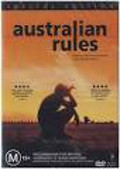
Directed by
Paul Goldman
98 minutes
Rated M
Reviewed by
Bernard Hemingway

Australian Rules
Synopsis: In Prospect Bay, South Australia, Gary 'Blacky' Black (Nathan Phillips) is a member of the local Australian Rules football team who are about to play in the area's Grand Final . Tensions are running high in the racially divided team and whilst Blacky's mum (Celia Ireland) offers some winning tips, victory on the field is not as sweet as is promised.Although our national football game provides the axis around which the story revolves, the title of this film sardonically refers less to the game itself than the archetypal Australian culture which the game mirrors and which the Hansonites (who get a quiet mention on a maggot-covered piece of newspaper) briefly turned to their own purpose - a banally antagonistic culture, born of loveless conditions, bred in isolation on a daily diet of prejudice and brutality.
In capturing the small town/small mind environment, the film does very well indeed, credit for which presumably goes to co-writer Phillip Gwynne on whose novel Deadly, Unna? this was based . In this respect the film strongly recalls Ivan Sens' recent Beneath Clouds in which the main character, is, like Blacky, able to tolerate the backwater stupidity around her because she can conceive of something beyond it. Both films lean heavily on the contrast between brutality and tenderness. In this film it is more overt or given more numerous dramatic embodiments (the penultimate scene, a confrontation between Blacky and his father is harrowing). Given the broader ambition of this film, to represent a culture, it would be worth pondering how characteristic this contrast is of the way we represent ourselves in film and story-telling. In fact the two films have many points of similarity: the isolated township languishing in a dry, flat sunburnt countryside (all beautifully photographed here by Mandy Walker), the two young male-female characters breaking away from their bleak inheritance, the ugliness of racial prejudice and so on. Also like Sens, Goldman makes use of non- or relatively inexperienced actors. The result is sometimes slightly gauche but it all contributes to giving the film authenticity. (One is also reminded in this respect of another film that dealt commendably with the destructive aspects of black/white relations in Australia, James Ricketson's Blackfellas, 1993)
Although the first third of the film may lead you to believe that the result is an exercise in parochial feel-goodism, stick with it and it develops into something much more. Casting is excellent with the main actors all outstanding. Sometimes the narrative tends to get a little bogged and the direction somewhat heavy-handed but if you are interested in Australian film and how we represent ourselves to ourselves this is worth catching.

Want more about this film?


Want something different?




